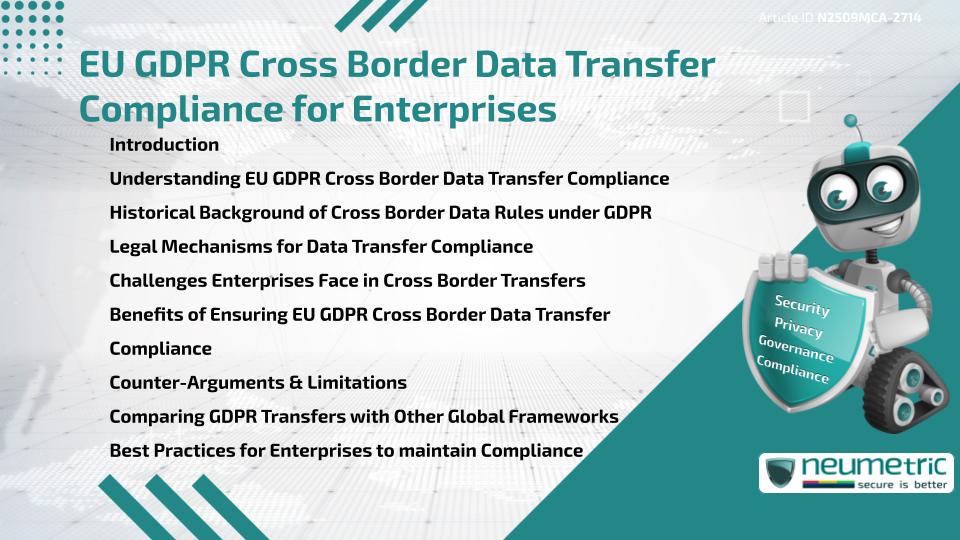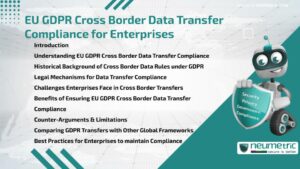Table of Contents
ToggleIntroduction
The EU GDPR cross border data transfer compliance is a critical requirement for enterprises that process or share Personal Data outside the European Economic Area [EEA]. It ensures that Personal Data leaving the EU is protected to the same standards guaranteed by the General Data Protection Regulation [GDPR]. Enterprises that prioritise EU GDPR cross border data transfer compliance reduce legal Risks, safeguard individual rights & maintain Business Continuity across international operations.
Understanding EU GDPR Cross Border Data Transfer Compliance
At its core, EU GDPR cross border data transfer compliance ensures that data transfers to countries outside the EEA meet GDPR’s stringent protection standards. It involves verifying that the recipient country provides adequate safeguards or, if not, that enterprises use approved mechanisms such as Standard Contractual Clauses [SCCs] or Binding Corporate Rules [BCRs]. Compliance is not optional-it is a legal obligation for enterprises that process EU Personal Data.
Historical Background of Cross Border Data Rules under GDPR
Cross border data transfer provisions became enforceable in May 2018 with the introduction of GDPR. They replaced the earlier Framework under the 1995 Data Protection Directive. The GDPR introduced stricter requirements for international data transfers & expanded the powers of supervisory authorities. The 2020 Schrems II ruling by the Court of Justice of the European Union further shaped compliance by invalidating the EU-US Privacy Shield, compelling enterprises to adopt stronger safeguards.
Legal Mechanisms for Data Transfer Compliance
Enterprises can rely on several mechanisms to achieve EU GDPR cross border data transfer compliance:
- Adequacy decisions: Recognition by the European Commission that a third country ensures adequate protection.
- Standard Contractual Clauses [SCCs]: Pre-approved contractual agreements ensuring Data Protection in transfers.
- Binding Corporate Rules [BCRs]: Internal rules for multinational companies approved by supervisory authorities.
- Derogations: Limited exceptions, such as explicit consent or necessity for contractual performance, applied in specific cases.
Challenges Enterprises Face in Cross Border Transfers
Enterprises often face complex challenges in achieving EU GDPR cross border data transfer compliance. These include:
- Constantly evolving regulatory interpretations across jurisdictions.
- High costs of implementing technical & contractual safeguards.
- Limited clarity following major rulings such as Schrems II.
- Operational disruption when data transfer mechanisms are invalidated or revised.
- Vendor & third party Risks in global supply chains.
Benefits of Ensuring EU GDPR Cross Border Data Transfer Compliance
Despite the difficulties, compliance offers significant benefits. It minimizes legal exposure, avoids heavy fines & strengthens Customer Trust in global operations. Enterprises that achieve compliance can operate seamlessly across borders, ensuring uninterrupted data flows with business partners. It also demonstrates a proactive commitment to accountability & ethical data practices.
Counter-Arguments & Limitations
Some critics argue that GDPR’s cross border transfer rules impose excessive burdens on enterprises, particularly small or medium-sized Organisations. Others highlight that despite compliance, Risks like Government surveillance in third countries cannot always be eliminated. While these limitations exist, compliance remains essential for avoiding penalties & protecting individual rights.
Comparing GDPR Transfers with Other Global Frameworks
GDPR’s approach to cross border data transfer is among the strictest worldwide. Other frameworks, such as the California Consumer Privacy Act [CCPA] or Brazil’s Lei Geral de Proteção de Dados [LGPD], also regulate international transfers but often with less prescriptive safeguards. By ensuring EU GDPR cross border data transfer compliance, enterprises can more easily align with these other frameworks, gaining flexibility in global markets.
Best Practices for Enterprises to maintain Compliance
To maintain EU GDPR cross border data transfer compliance, enterprises should adopt Best Practices such as:
- Conducting transfer impact assessments before data is shared internationally.
- Using encryption & pseudonymization to enhance technical safeguards.
- Regularly reviewing & updating contractual agreements like SCCs.
- Training staff on compliance obligations & vendor management.
- Monitoring regulatory updates to adapt quickly to legal changes.
Conclusion
The EU GDPR cross border data transfer compliance is vital for enterprises managing international data flows. By using appropriate mechanisms & adopting Best Practices, Organisations can reduce Risks, protect individual rights & support seamless global operations.
Takeaways
- EU GDPR cross border data transfer compliance ensures EU-level protection outside the EEA.
- Legal mechanisms include adequacy decisions, SCCs & BCRs.
- Enterprises face challenges such as high costs & evolving regulations.
- Compliance enhances trust, reduces Risks & supports global operations.
FAQ
What is EU GDPR cross border data transfer compliance?
It refers to ensuring that Personal Data transferred outside the EEA meets GDPR protection standards.
What mechanisms are available for Lawful transfers?
Mechanisms include adequacy decisions, SCCs, BCRs & limited derogations.
Why was the EU-US Privacy Shield invalidated?
It was invalidated in the Schrems II ruling due to concerns about US surveillance laws.
Do small enterprises also need to comply with cross border rules?
Yes, any enterprise processing EU Personal Data must ensure compliance regardless of size.
How often should transfer agreements be reviewed?
They should be reviewed regularly & updated when legal frameworks or vendor relationships change.
Is compliance alone enough to prevent all Risks?
No, compliance reduces Risks but cannot eliminate external Threats such as foreign Government access.
Need help for Security, Privacy, Governance & VAPT?
Neumetric provides organisations the necessary help to achieve their Cybersecurity, Compliance, Governance, Privacy, Certifications & Pentesting needs.
Organisations & Businesses, specifically those which provide SaaS & AI Solutions in the Fintech, BFSI & other regulated sectors, usually need a Cybersecurity Partner for meeting & maintaining the ongoing Security & Privacy needs & requirements of their Enterprise Clients & Privacy conscious Customers.
SOC 2, ISO 27001, ISO 42001, NIST, HIPAA, HECVAT, EU GDPR are some of the Frameworks that are served by Fusion – a SaaS, multimodular, multitenant, centralised, automated, Cybersecurity & Compliance Management system.
Neumetric also provides Expert Services for technical security which covers VAPT for Web Applications, APIs, iOS & Android Mobile Apps, Security Testing for AWS & other Cloud Environments & Cloud Infrastructure & other similar scopes.
Reach out to us by Email or filling out the Contact Form…





